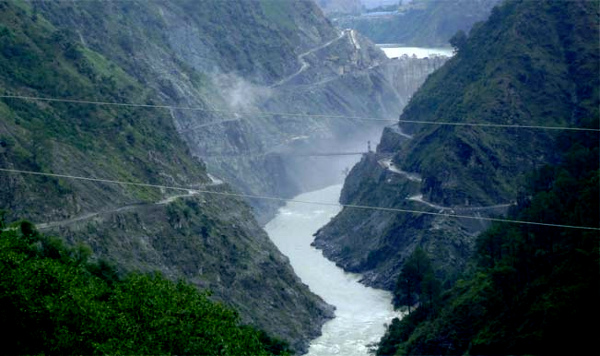India has restarted work on construction of 850MW Ratle hydropower project on the Chenab River leaving Pakistan clueless about how to stop its eastern neighbor from going ahead with the controversial project.
The work on the dam has been restarted despite a pause announced by the World Bank on December 12, 2016. Islamabad wants the World Bank to constitute a 7-member international court of arbitration, while India wants that the dispute should be resolved through a neutral expert.
However, when this reporter asked Federal Minister for Water Resources Faisal Vawda as to when the government was going to push the World Bank to break the pause and pressure India for resolution of dispute on Kishanganga project, completed with an objectionable design, and Ratle hydropower project being constructed with a faulty design, he said, ‘’We are keeping an eye on the development and will soon hold a meeting with the attorney general for Pakistan on the issue of pause, and way forward will be worked out.
“At the moment, we are in the transition period because of the World Bank pause,’’ he said. Syed Mehr Ali Shah, Commissioner Pakistan Commission of Indus Water, however says so far India has not started work on the Ratle project.
Pakistan believes, the official said, that Kishanganga’s pondage should be a maximum of one million cubic meters instead of 7.5 million cubic meters, while the intake should be up to four meters and spillways should be raised to nine meters.
Official sources also said the World Bank had already asked Pakistan on May 31, 2018 to move a neutral expert for resolving the Kishanganga and Ratle hydropower projects issue. They said the authorities had not yet sensitised the government’s top leadership to the World Bank’s advice.
They have kept the top man in dark to avoid wrath of the government, as the pause has enabled India to complete Kishanganga project and is still enabling it to complete Ratle project.
Pakistan has four objections to the Ratle project: The freeboard should be one meter instead of two meters, pondage should be a maximum of eight million cubic meters instead of 24 million, intake level should be at 8.8 meters and spillways at the height of 20 meters.
It believes Ratle’s design would reduce Chenab flows by 40 per cent at Head Marala causing considerable loss to crops. The dam is believed to be three times larger than the Baglihar dam.
However, in the wake of pause, India has already managed to complete and make 330MW Kishenganga hydropower project functional. In a letter written on April 3, 2018 Pakistan held the World Bank responsible for construction of Kishenganga project arguing that the pause had given India ample time to complete Kishanganga project.
Since the pause earlier taken by the World Bank in December 2016 is still in place and under the latest scenario India has decided to restart construction work on the Rattle hydropower project, it is feared that India will try to take maximum benefit from the pause and complete the Ratle project.
Top officials at PCIW say work had been started on the dam portion. The letter written on November 8, 2018 by Tariq Karim, counsellor at the Pakistan High Commission in New Delhi, to the Foreign Office of Pakistan confirms that India has decided to restart construction work on Rattle hydropower project.
A copy of the letter from the Pakistan High Commission is also in possession of The News that clearly says that Ratle project was earlier scheduled to complete in 2017 but now its commissioning will be achieved in 2022.
‘’GVK company started work on the project in 2012 and in 2014 it abandoned it because of tariff controversy. Now the governor administration in Indian Held Kashmir has proposed to the Union Power Ministry a joint venture between the Indian Held Kashmir and central government for execution of project a month after the Jammu and Kashmir state administrative council gave go-ahead.
“The World Bank has started advising Pakistani authorities to move a neutral expert for the legal fight to do away with its objections to the said two projects,” the official said. The World Bank that brokered the 1960 Indus Waters Treaty between the two nuclear states has failed so far to constitute a 7-member full court of arbitration.
India does not want resolution of the disputed project at the CoA level, rather it wants that a neutral expert should be the forum for the resolution. Now the authorities concerned, the official claimed, in Pakistan are receiving vibes from the bank to bring in a neutral expert to resolve the issue of disputed projects.
It argues that CoA cannot be constituted by keeping India, the party to the dispute, annoyed. It says CoA can be constituted in case both the parties to the dispute agree on it. “So Pakistan is left with no option but to move a neutral expert. If authorities in Pakistan do not agree with the World Bank’s advice, then India will get another opportunity to construct Ratle Hydropower project with objectionable designs.”
Source: The News
Image Courtesy: India.com
You may also like
-
Beware! Chinese Hackers are Using VLC Media Player to Spy on You
-
Israel Participates in US Mideast Naval Exercise wih Saudi Arabia and Oman – IMX 22
-
Pakistani Establishment Controlling ‘Family Business’ of Selling Kashmir Narrative, Uses Issue as Survival Strategy: Report
-
After Suspending Twitter ‘Indefinitely’, Nigerian Govt Joins Made-In-India Microblogging Platform ‘Koo’
-
Pam Gosal, First Indian-Origin Woman to be Scottish Lawmaker
